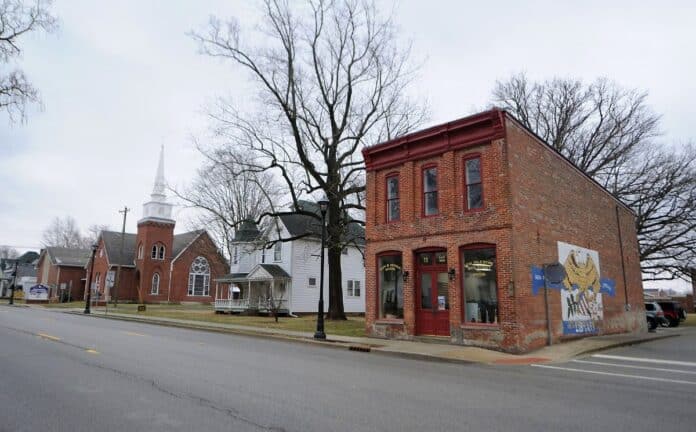
NEW PALESTINE — After six years of showcasing and sharing the town’s past, curators of the New Palestine History Museum plan to permanently close its doors.
Town leaders want to make new plans for one of the town’s oldest structures, the Mary M. Nichols building at 11 E. Main St., where the museum is located.
Officials say they remain in favor of having a local museum; they just can no longer afford to support it financially.
[sc:text-divider text-divider-title=”Story continues below gallery” ]
Over the past six years, since the museum opened in 2015, the town has spent an estimated $40,000 in repairs on the building and has paid all monthly utility, internet, phone and cable bills, which they estimate at between $4,000 and $5,000 a year.
The town owns the building, which was built in 1900, according to county property records.
“I don’t understand why we still have cable and internet service in that building when nobody ever used it,” councilman Clint Bledsoe said. “It costs us more to have those services there than it does at town hall.”
Town manager Jim Robinson said the town approached the museum’s leadership and New Palestine Main Street, which is the governing body of the museum, and asked them to share the structure with another tenant who was willing to pick up some of the costs.
Museum officials balked at that idea and decided to close it.
“There have been some negative responses to the council that we’re kicking out the museum, and that is not our intent,” Robinson said. “The intent was to broaden the whole museum atmosphere.”
Robinson noted the town has several money-making opportunities for the historic structure and the surrounding property. The town has begun holding street concerts in the area, and officials have talked about adding a weekly farmer’s market or leasing out part of the building.
“We have a lot of interest in that building and Depot Street,” Robinson said.
Town officials estimated the museum was open at most a couple of weeks a year, which did not justify the expense. They also noted the museum did not generate any funding to maintain itself, officials said.
“They were more than welcome to share the building,” Robinson said. “But, we did want some new members added to their board.”
Michael Dean, who represents the museum’s leadership, said the museum has been maintained and staffed by unpaid volunteers over the past six years. The lead organization, New Palestine Main Street, has been a good custodian of the building, he said.
Dean and others associated with New Palestine Main Street didn’t like the idea of sharing the building space and made the decision to shut down. Dean and Becky Gaines, who started the museum, were asked to step down from the board and to bring on new board members with fresh ideas on how to generate funding to keep the museum afloat.
“I acknowledge that the town manager or town council never said to close the museum,” Dean said.
Dean and Gaines have both stepped down from the board and are taking the museum they built with them.
“Our involvement with the museum will end,” Dean said. “Becky and I will take items out and allow any loaned items to be reclaimed.”
Dean told the council at a recent meeting that the town had never asked museum officials for money over the past six years and that they were taken aback when the town unexpectedly demanded they help generate revenue to pay some of the bills.
“As a nonprofit museum, we cannot afford that cost,” Dean said. “The decision to close our part was a sad decision.”
Councilman Bill Niemier noted the original agreement with the museum and New Palestine Main Street was that they could occupy the building with the town picking up the bills. However, the goal was for museum officials to work on securing grants and membership funding and become self-sufficient, which never happened.
“It’s not a profit source, but for the past several years we’ve been paying for everything,” Niemier said. “For us to continue to make 100 percent of the repairs and pay 100 percent of the utilities, it kind of went contrary from the original agreement and understanding.”
Niemier said the decision to make changes on how to better utilize the building — which housed a town library before it was a museum — really is in the best interest of the town’s residents.




